2014年6月英语六级真题第二套(含答案)
- 格式:doc
- 大小:106.50 KB
- 文档页数:14
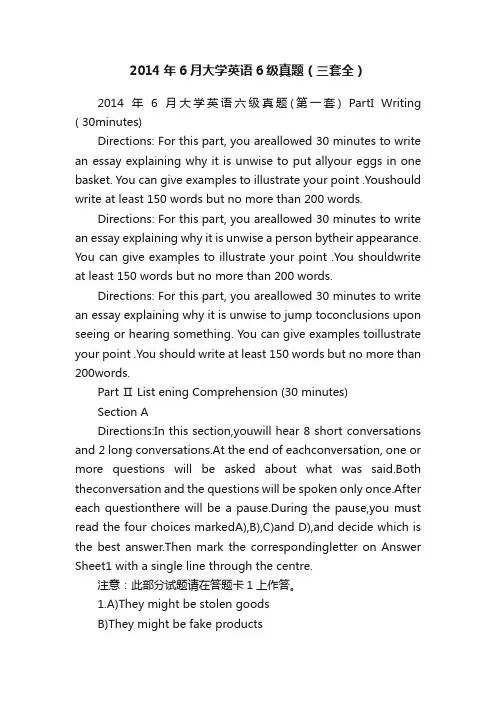
2014年6月大学英语6级真题(三套全)2014年6月大学英语六级真题(第一套) PartI Writing ( 30minutes)Directions: For this part, you areallowed 30 minutes to write an essay explaining why it is unwise to put allyour eggs in one basket. You can give examples to illustrate your point .Youshould write at least 150 words but no more than 200 words.Directions: For this part, you areallowed 30 minutes to write an essay explaining why it is unwise a person bytheir appearance. You can give examples to illustrate your point .You shouldwrite at least 150 words but no more than 200 words.Directions: For this part, you areallowed 30 minutes to write an essay explaining why it is unwise to jump toconclusions upon seeing or hearing something. You can give examples toillustrate your point .You should write at least 150 words but no more than 200words.Part Ⅱ List ening Comprehension (30 minutes)Section ADirections:In this section,youwill hear 8 short conversations and 2 long conversations.At the end of eachconversation, one or more questions will be asked about what was said.Both theconversation and the questions will be spoken only once.After each questionthere will be a pause.During the pause,you must read the four choices markedA),B),C)and D),and decide which is the best answer.Then mark the correspondingletter on Answer Sheet1 with a single line through the centre.注意:此部分试题请在答题卡1上作答。
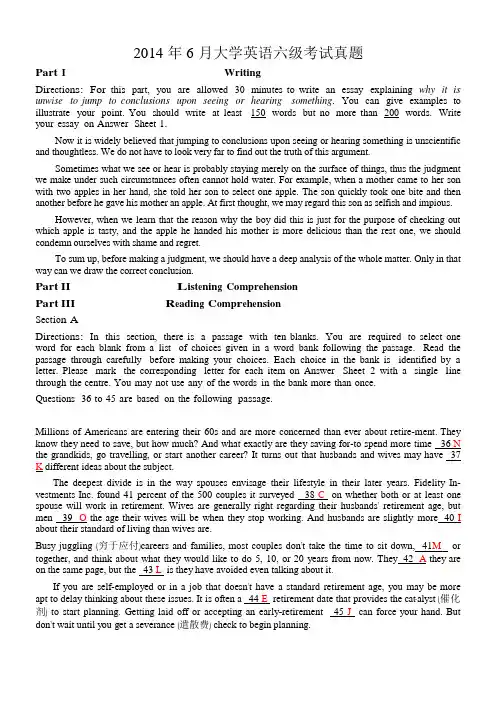
2014 年 6 月大学英语六级考试真题Part I WritingD i r e ct i o n s:For this part, you are allowed 30 minutes to write an essay explaining why it is unwise to jump to conclusions upon seeing or hearing something. You can give examples to illustrate your point. You should write at least 150 words but no more than 200 words. Write your essay on Answer Sheet 1.Now it is widely believed that jumping to conclusions upon seeing or hearing something is unscientific and thoughtless. We do not have to look very far to find out the truth of this argument.Sometimes what we see or hear is probably staying merely on the surface of things, thus the judgment we make under such circumstances often cannot hold water. For example, when a mother came to her son with two apples in her hand, she told her son to select one apple. The son quickly took one bite and then another before he gave his mother an apple. At first thought, we may regard this son as selfish and impious.However, when we learn that the reason why the boy did this is just for the purpose of checking out which apple is tasty, and the apple he handed his mother is more delicious than the rest one, we should condemn ourselves with shame and regret.To sum up, before making a judgment, we should have a deep analysis of the whole matter. Only in that way can we draw the correct conclusion.Part II L i s t e n i n g ComprehensionPart III R e ad i n g C o m p r e h e ns i onSect i o n AD i r e ct i o n s: In this section, there is a passage with ten blanks. You are required to select one word for each blank from a list of choices given in a word bank following the passage. Read the passage through carefully before making your choices. Each choice in the bank is identified by a letter. Please mark the corresponding letter for each item on Answer Sheet 2 with a single li ne through the centre. You may not use any of the words in the bank more than once.Questions 36 to 45 a r e based on the following pa ss ag e.Millions of Americans are entering their 60s and are more concerned than ever about retire-ment. They know they need to save, but how much? And what exactly are they saving for-to spend more time 36 N the grandkids, go travelling, or start another career? It turns out that husbands and wives may have 37 K different ideas about the subject.The deepest divide is in the way spouses envisage their lifestyle in their later years. Fidelity In- vestments Inc. found 41 percent of the 500 couples it surveyed 38 C on whether both or at least one spouse will work in retirement. Wives are generally right regarding their husbands’retirement age, but men 39 O the age their wives will be when they stop working. And husbands are slightly more 40 I about their standard of living than wives are.Busy juggling (穷于应付)careers and families, most couples don’t take the time to sit down, 41M or together, and think about what they would like to do 5, 10, or 20 years from now. They 42 A they are on the same page, but the 43 L is they have avoided even talking about it.If you are self-employed or in a job that doesn’t have a standard retirement age, you may be more apt to delay thinking about these issues. It is often a 44 E retirement date that provides the c at-a lyst (催化剂)to start planning. Getting laid off or accepting an early-retirement 45 J can force your hand. But don’t wait until you get a severance (遣散费) check to begin planning.S e ct i o n BWhat If Middle-Class J o b s D i s a ppe a r?A) The most recent recession in the United States began in December of 2007 and ended in June of2009, according to the National Bureau of Economic Research. However, two years after the of- ficial end of the recession, few Americans would say that economic troubles are behind us. The unemployment rate, in particular, remains above 9%. Some labour market indicators, such as the proportion of long-term unemployed, are worse now than for any post-war recession.B) There are two widely circulated narratives to explain what’s going on. The Keynesian narrativeis that there has been a major drop in aggregate demand. According to this narrative, the slump can be largely cured by using monetary and fiscal (财政的) stimulus. The main anti-Keynesian narrative is that businesses are suffering from uncertainty and over-regulation. According to this narrative, the slump can be cured by having the government commit to and follow a morehands-off approach.C)I want to suggest a third interpretation. Without ruling out a role for aggregate demand or for theregulatory environment, I wish to suggest that structural change is an important factor in the cur- rent rate of high unemployment. The economy is in a state of transition, in which the mid-dle-class jobs that emerged after World War II have begun to decline. As Erik Brynjolfsson and Andrew McAfee put it in a recent e-book Race Against the Machine: “The root of our problems is not that we’re in a great recession, or a great stagnation (停滞), but rather that we are in the early throes (阵痛) of a great restructuring.”D) In fact, I believe that the Great Depression of the 1930s can also be interpreted in part as an eco-nomictransition. The impact of the internal combustionengine (内燃机) and the small electric motor on farming and manufacturing reduced the value of uneducated labourers. Instead, by the 1950s, a middle class of largely clerical (从事文秘工作的)workers was the most significant part of the labour force. Between 1930 and 1950, the United States economy underwent a Great Transition. Demand fell for human effort such as lifting, squeezing, and hammering. Demand in- creased for workers who could read and follow directions. The evolutionary process eventually changed us from a nation of labourers to a nation of clerks.E) The proportion of employment classified as “clerical workers” grew from 5.2% in 1910 to a peak of 19.3percent in 1980. “However, by 2000 this proportion had edged down to 17.4 %”Over- all, workers classified as clerical workers, technical workers, managers, officials exceeded 50% of the labour force by 2000. Corresponding declines took place in the manual occupations. Workers classified as labourers, other than farm hands or miners, peaked at 11.4% of the labour force in 1920 but were barely 6% by 1950 and less than 4% by 2000. Farmers and farm labourers fell from 33% of the labour force in 1910 to less than 15% by 1950 and only 1.2% in 2000.F)The introduction of the tractor and improvements in the factory rapidly reduced the demand foruneducated workers. By the 1930s, a marginal farm hand could not produce enough to justify his employment. Sharecropping, never much better than a subsistence occupation, was no longer visable ( 可行的). Meanwhile, machines were replacing manufacturing occupations like cigar rolling and glass blowing for light bulbs.G)The structural-transition interpretation of the unemployment problem of the 1930s would be that thedemand for uneducated workers in the United States had fallen, but the supply remained high. The high school graduation rate was only 8.8% in 1912 and still just 29% in 1931. By 1950, it had reached 59% . With a new generation of workers who had completed high school, the mismatch between skills and jobs had been greatly reduced.H) What took place after the Second World War was not the revival of a 1920s economy, with its smallfarming units, urban manufacturing, and plurality of labourers. Instead, the 1950s saw the creation of a new suburban economy, with a plurality of white-collar workers. With an expanded transportation and communications infrastructure (基础设施), businesses needed telephone op-erators, shipping clerks, and similar occupations. If you could read, follow simple instructions, and settle into a routine, you could finda job in the post-war economy.I)The trend away from manual labour has continued. Even within the manufacturing sector, the shareof production and non-supervisory workers in manufacturing employment went from over 85% just after the Second World War to less than 70% in more recent years. To put this another way, the proportion of white-collar work in manufacturing has doubled over the past 50 years. On the factory floor itself, work has become less physically demanding. Instead, it requires more cognitive skills and the ability to understand and carry out well-defined procedures.J)As noted earlier, the proportion of clerical workers in the economy peaked in 1980. By that date, computers and advanced communications equipment had already begun to affect telephone oper- ations and banking. The rise of the personal computer and the Internet has widened the impact of these technologies to include nearly every business and industry.K) The economy today differs from that of a generation ago. Mortgage and consumer loan und er-writers (风险评估人)have been replaced by credit scoring. Record stores have been replaced by music downloads. Book stores are closing, while sales of books on electronic readers have in- creased. Data entry has been moved off shore. Routine customer support also has been out- s ourced (外包) overseas.L) These trends serve to limit the availability of well-defined jobs. If a job can be characterized by a precise set of instructions, then that job is a candidate to be automated or outsourced to modestly educated workers in developing countries. The result is what David Autor calls the polarization of the American job market.M)Using the latest Census Bureau data, Matthew Slaughter found that from 2000 to 2010 the real earnings of college graduates (with no advanced degree)fell by more in percentage terms than the earnings of high school graduates. In fact, over this period the only education category to show an increase in earnings was those with advanced degrees.N)The outlook for mid-skill jobs would not appear to be bright. Communication technology and computer intelligence continue to improve, putting more occupations at risk. For example, many people earn a living as drivers, including trucks and taxicabs. However, the age of driver-less ve- hicles appears to be moving closer. Another example is in the field of education. In the fall of 2011, an experiment with an online course in artificial intelligence conducted by two Stanford professors drew tens of thousands of registrants (报名者). This increases the student-teacher ra-tio by a factor of close to a thousand. Imagine the number of teaching jobs that might be elimi- nated if this could be done for math, economics, chemistry, and so on.O) It’s important to bear in mind that when we offer a structural interpretation of unemployment, a “loss of jobs”means an increase in productivity. Traditionally, economists have argued that pro- ductivity increases are a good thing, even though they may cause unemployment for some work- ers in the short run. In the long run, the economy does not run out of jobs. Rather, new jobs e- merge as old jobs disappear. The story we tell is that average well-being rises, and the more that people are able to adapt, the more widespread the improvement becomes.注意院此部分试题请在答题卡 2 上作答遥46. Even factory floor work today has become intellectually challenging rather than physically demand- ing. I47. Increases in productivity prove beneficial though some people may lose their jobs temporarily.O48. The unemployment rate remained high even two years after the government declared the recent re- cessionwas over.A49. The author suggests that the recent high unemployment rate is mainly caused by a decrease of mid- dle-class jobs.C50. The creation of a suburban economy in the 1950s created lots of office jobs.H51. In the first decade of the 21st century, only people with postgraduate degrees experienced an in- crease inearnings.M52. One economics theory suggests using monetary and fiscal stimulus to cope with an economic re-cession.B53. The popularity of online courses may eliminate many teaching jobs.N54. Computer technology has brought about revolutionary changes in the record and book business.K55. White-collar workers accounted for more than half of the labour force by the end of the 20th century. ES e ct i o n CPassage O neQuestions 56 to 60 a r e based on the following pa ss a g e.“Deep reading”-as opposed to the often superficial reading we do on the Web-is an endan- gered practice, one we ought to take steps to preserve as we would a historic building or a significant work of art.Its disappearance would jeopardize the intellectual and emotional development of gener- ations growing up online, as well as the preservation of a critical part of our culture: the novels, po-ems and other kinds of literature that can be appreciated only by readers whose brains, quite literally, have been trained to apprehend them.Recent research in cognitive science and psychology has demonstrated that deep reading-slow, immersive, rich in sensory detail and emotional and moral complexity is a distinctive experi- ence, different in kind from the mere decoding of words. Although deep reading does not, strictly speaking, require a conventional book, the built-in limits of the printed page are uniquely helpful to the deep reading experience. A book’s lack of hyperlinks “超链接”, for example, frees the reader from making decisions. Should I click on this link or not?-allowing her to remain fully immersed in the narrative.That immersion is supported by the way the brain handles language rich in detail, indirect refer- ence and figures of speech: by creating a mental representation that draws on the same brain regions that would be active if the scene were unfolding in real life. The emotional situations and moral dilemmas that are the stuff of literature are also vigorous exercise for the brain, propelling us inside the heads of fictional characters and even, studies suggest, increasing our real-life capacity for empathy(认同).None of this is likely to happen when we’re browsing through a website. Although we call the activity by the same name, the deep reading of books and the information-driven reading we do on the Web are very different, both in the experience they produce and in the capacities they develop. A growingbody of evidence suggests that online reading may be less engaging and less satisfying, even for the “digital natives”for whom it is so familiar. Last month, for example, Britain’s National Lit-eracy Trust released the results of a study of 34,910 young people aged 8 to 16. Researchers reported that 39% of children and teens read daily using electronic devices, but only 28% read printed materi- als every day. Those who read only onscreen were three times less likely to say they enjoy reading very much and a third less likely to have a favorite book. The study also found that young people who read daily only onscreen were nearly two times less likely to be above-average readers than those who read daily in print or both in print and onscreen.56. What does the author say about”deep reading’?A) It serves as a complement to online reading.B) It should be preserved before it is too late.C) It is mainly suitable for reading literature.D) It is an indispensable part of education.57. Why does the author advocate the reading of literature?A) It helps promote readers’ intellectual and emotional growth.B) It enables readers to appreciate the complexity of language.C)It helps readers build up immersive reading habits.D) It is quickly becoming an endangered practice.58. In what way does printed-page reading differ from online reading?A) It ensures the reade r’s cognitive growth.B) It enables the reader to be fully engaged.C) It activates a different region of the brain.D) It helps the reader learn rhetorical devices.59. What do the studies show about online reading?A) It gradually impairs one’s eyesight.B) It keeps arousing readers’ curiosity.C) It provides up-to-date information.D) It renders reading less enjoyable.60. What do we learn from the study released by Britain’s National Literacy Turst?A) Onscreen readers may be less competent readers.B) Those who do reading in print are less informed.C) Young people find reading onscreen more enjoyable.D) It is now easier to find a favourite book online to read.Passage T woQuestions 61 to 65 a r e based on the following pa ss a g e.Many current discussions of immigration issues talk about immigrants in general, as if they were abstract people in an abstract world. But the concrete differences between immigrants from dif- ferent countries affect whether their coming here is good or bad for the American people.The very thought of formulating immigration laws from the standpoint of what is best for the American people seems to have been forgotten by many who focus on how to solve the problems of illegal immigrants.It is hard to look for “the ideal outcome” on immigration in the abstract. Economics ProfessorMilton Friedman once said, “The best is the enemy of the goo d”which to me meant that attempts to achieve an unattainable ideal can prevent us from reaching good outcomes that are possible in prac- tice.Too much of our current immigration controversy is conducted in terms of abstract ideals, such as “We are a nation of immigrants.”Of course we are a nation of immigrants. But we are also a na-tion of people who wear shoes. Does it follow that we should admit anybody who wears shoes?The immigrants of today are very different in many ways from those who arrived here a hun- dred years ago. Moreover, the society in which they arrive is different. To me, it is better to build a wall around the welfare state than the country.But the welfare state is already here-and, far from having a wall built around it, the welfare state is expanding in all directions. We do not have a choice between the welfare state and open bor- ders. Anything we try to do as regards immigration laws has to be done in the context of a huge wel- fare state that is already a major, inescapable fact of life.Among other facts of life utterly ignored by many advocates of de facto amnesty (事实上的大赦) is that the free international movement of people is different from free international trade in goods.Buying cars or cameras from other countries is not the same as admitting people from those countries or any other countries. Unlike inanimate objects, people have cultures and not all cultures are compatible with the culture in this country that has produced such benefits for the American peo- ple for so long.Not only the United States, but the Western world in general, has been discovering the hard way that admitting people with incompatible cultures is an irreversible decision with incalculable consequences. If we do not see that after recent terrorist attacks on the streets of Boston and London, when will we see it?“Comprehensive immigration reform”means doing everything all together in a rush, without time to look before we leap, and basing ourselves on abstract notions about abstract people.61. What does the author say about immigrants in America?A) They all hope to gain citizenship and enjoy the welfare.B) They come to America with different dreams and purposes.C) Their background may determine whether they benefit the American people.D) Their cultures affect the extent to which they will achieve success in America.62. What does the author try to say by citing Milton Friedman’s remark?A) It is hardly practical to find an ideal solution to America’s immigration problem.B) Ideal outcomes could be produced only by comprehensive immigration reform.C) As for immigration, good results cannot be achieved without good intentions.D) The proper solution of immigration issues is an ideal of the American public.63. What is the author’s view regarding America’s immigration policy?A) America should open its borders to immigrants from different countries.B) Immigrants have contributed greatly to the welfare of American people.C) Unrestricted immigration will undermine the American welfare state.D) There is no point building a wall around the American welfare state.64. What is the author;s purpose in citing the recent terrorist attacks on the streets of Boston and London?A) To show that America should join hands with Europe in fighting terrorists.B) To prove that it is high time America made comprehensive immigration reforms.C) To prove that terrorism is the most dangerous threat to America and the world in general.D) To show that immigrants’ cultural incompatibility with the host country has consequences.65. What is the author”s attitude towards :comprehensive immigration reform”?A) Supportive. B) Negative.C) Wait-and-see. D) Indifferent.Part IV TranslationEnglish. You should write your answer on Answer Sheet 2.中文热词通常反映社会变化和文化袁有些在外国媒体上愈来愈流行。
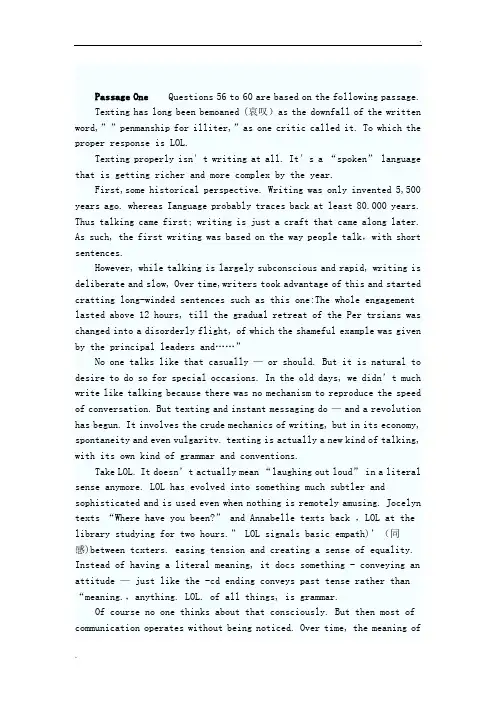
Passage One Questions 56 to 60 are based on the following passage.Texting has long been bemoaned (哀叹)as the downfall of the written word,””penmanship for illiter,”as one critic called it. To which the proper response is LOL.Texting properly isn′t writing at all. It′s a “spoken” language that is getting richer and more complex by the year.First,some historical perspective. Writing was only invented 5,500 years ago. whereas Ianguage probably traces back at least 80.000 years. Thus talking came first; writing is just a craft that came along later. As such, the first writing was based on the way people talk,with short sentences.However, while talking is largely subconscious and rapid, writing is deliberate and slow, Over time,writers took advantage of this and started cratting long-winded sentences such as this one:The whole engagement lasted above 12 hours, till the gradual retreat of the Per trsians was changed into a disorderly flight, of which the shameful example was given by the principal le aders and……”No one talks like that casually — or should. But it is natural to desire to do so for special occasions. In the old days, we didn’t much write like talking because there was no mechanism to reproduce the speed of conversation. But texting and instant messaging do —and a revolution has begun. It involves the crude mechanics of writing, but in its economy, spontaneity and even vulgaritv. texting is actually a new kind of talking, with its own kind of grammar and conventions.Take LOL. It doe sn’t actually mean “laughing out loud” in a literal sense anymore. LOL has evolved into something much subtler and sophisticated and is used even when nothing is remotely amusing. Jocelyn texts “Where have you been?” and Annabelle texts back ,LOL at the li brary studying for two hours.” LOL signals basic empath)’(同感)between tcxters. easing tension and creating a sense of equality. Instead of having a literal meaning, it docs something - conveying an attitude — just like the -cd ending conveys past tense rather than “meaning.,anything. LOL. of all things, is grammar.Of course no one thinks about that consciously. But then most of communication operates without being noticed. Over time, the meaning ofa word or an expression drifts meat used to mean any kind of food, silly used to mean, believe it or not,blessed.Civilization, then,is fine 一 people banging away on their smartphones are fluently using a code separate from the one they use in actual writing, and there is no evidence that texting is ruining composition skills. Worldwide people speak differently from the w ay they write, and texting -quick, casual and only intended to be read once —is actually a way of talking with your fingers.56. What do critics say about texting?A) It is mainly confined to youngstersB) It competes with traditional writing.C) It will ruin the wnttcn language.D) It is often hard to understand.57. In what way does the author say writing is different from talking?A) It is crafted with specific skills.C) It does not have as long a history.B) It expresses ideas more accuratcly.D) It is not as easy to comprehend.58. Why is LOL much used in tcxting?A) It brings textcrs closer to each other.B) It shows the tcxtcr's sophistication.C) It is a trendy way to communicateD) It adds to the humor of the text59. Examples like meat and silly are cited to showA) the difTerencc between writing and talkingB) how difTercntly words are used in tcxtingC) why people use the words the way they doD) the gradual change of word meaning60.what does the author think of texting?A)It facilitates exchange of ideas among people.B)It is a new form of verbal communication.C)It deteriorates pelple's composition skills.D)It hastens the decline of the written word.Passage Two Questions 61to 65are based on the following passage.it's possible to admire oprah winfrey and still wish Harvard hadn't awarded her an honorary doctor of law degree and the commencement(毕业典礼)speaker spot at yesterday's graduation.There's no question Oprah's achievements place her in the temple of American success stories. Talent,charm,and an exceptional work ethic have rarely hurled anyone of world's most successful entertainment icons and the firstAfrican-American female billionaire.Honorary degrees are often conferred on non-academic leaders in the arts,business,and politics.Harvard's list in recent years has included Kofi fi Annan,Bill Gates,Meryl Streep,and David Souter.But Oprah's list in recent years has included Kofi Annan,Bill Gates,Mery1 Streep,and david souter.But Oprah's particular brand of celebrity is not a good fit for the values of a university whose motto(座右铭),Veritas,meanstruth.Oprah's passionate advocacy extends,unfortunately,to a hearty embrace of fake science.Most notoriously,Oprah's validation of jenny McCarthy's claim that vaccines cause autism(自闭症)has no doubt contributed to much harm through the foolish avoidance of vaccines.Famous people arc entitled to a few failings, like the rest of us. and the choice of commencement speakers often reflects a balance of insututional pnonties and aspirations. Judging from our conversations with many students. Oprah was a widely popular choice.But this vote of confidence in Oprah sends a troubling message at precisely the time when American univereities need to do more to advance the cause of reason. As former Dean of Harvard College. Harry Lewis, noted in a blog post about his objections. “It seems vcrv odd for Harvard to honor such a high profile popularizer of the irrational…… at a time when political and religious nonsense so jeopardize the rule of reason in this allegedly enlightened democr acy and around the world.”As America′s oldest and most visible university. Harvard has a spccial opportunity to convey its respcct for science not only through its research and teaching programs but also in its public affirmation of evidence-based inquiry.Unfortunately,many American universities seem awfully busy protecting their brand name and not nearly busy enough protecting the pursuit of knowledge. A recent article in The Harvard Crimson noted the shocking growth of Harvard′s public relations arm in the last five yearsand it questioned whether a focus on risk management and avoiding controversywas really the best outward-looking face of this great institution.As American research universities begin to resemble profit centers and entertainment complexes, it’s easy to lose sight of their primary mission; to produce and spread knowledge.This mission depends on traditions of rational discourse and vigorous defense of the scientific method.Oprah Winfrey’s honoray doctorate was a step in the wrong direction.61.what do we learn about Oprah Winfrey from the passage?A)She was a distinguished graduate of H arvard School of LaW.B)She worked her way to success in the entertainment industry.C)She used to abuse her children when she was a young mother.D)She achieved her fame through persistent advocacy of fake science.62.Why does the author deem it inappropriate for Harvard to confer an honorary degree on Oprah winfrey?A) She did not specialize in the study of law.B)She was known as a supporter of fake science.C)She was an icon of the entertainment industryD)She had not distinguished herself academically.63.How did Harry Lewis react to Harvard’s decision in his blong post ?A)He was strongly against it.B)He considered it unpopular.C)He thought it w ould help enhance Harvard’s reputation.D)He thought it represented the will of the Harvard community.64.What is the author’s regret about many American universities?A)They show inadequate respect for evidence-based inquiryB)They fall short of expectations in teaching and researchC)They attach too much importance to public relationsD)They are tolerant of political and religious nonsense65.What does the author think a prestigious university like H arvard should focus on?A)Cultivation of student creativityB)Liberation of the human mindC)Liberation of the human mindD)Pursuit of knowledge and truth。
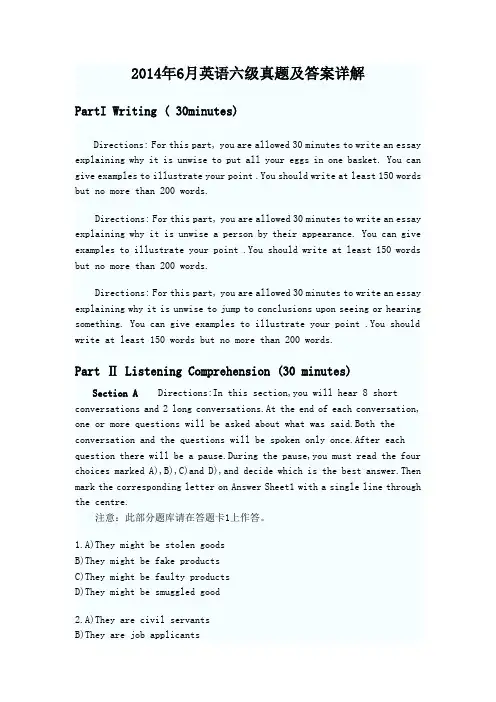
2014年6月英语六级真题及答案详解PartI Writing ( 30minutes)Directions: For this part, you are allowed 30 minutes to write an essay explaining why it is unwise to put all your eggs in one basket. You can give examples to illustrate your point .You should write at least 150 words but no more than 200 words.Directions: For this part, you are allowed 30 minutes to write an essay explaining why it is unwise a person by their appearance. You can give examples to illustrate your point .You should write at least 150 words but no more than 200 words.Directions: For this part, you are allowed 30 minutes to write an essay explaining why it is unwise to jump to conclusions upon seeing or hearing something. You can give examples to illustrate your point .You should write at least 150 words but no more than 200 words.Part Ⅱ Listening Comprehension (30 minutes) Section A Directions:In this section,you will hear 8 short conversations and 2 long conversations.At the end of each conversation, one or more questions will be asked about what was said.Both the conversation and the questions will be spoken only once.After each question there will be a pause.During the pause,you must read the four choices marked A),B),C)and D),and decide which is the best answer.Then mark the corresponding letter on Answer Sheet1 with a single line through the centre.注意:此部分题库请在答题卡1上作答。
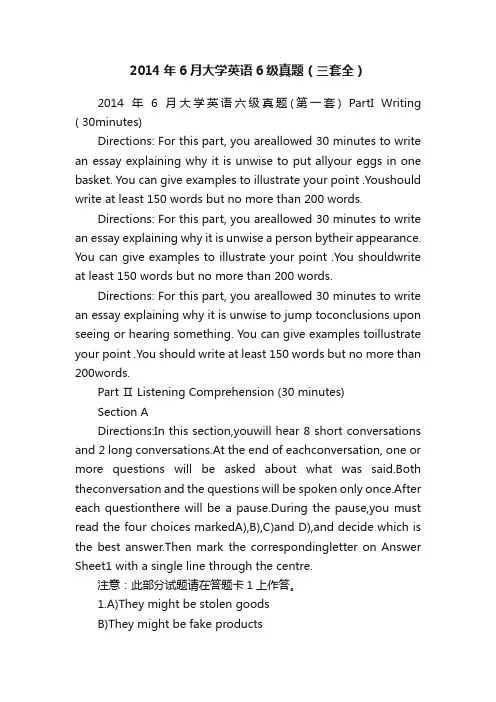
2014年6月大学英语6级真题(三套全)2014年6月大学英语六级真题(第一套) PartI Writing ( 30minutes)Directions: For this part, you areallowed 30 minutes to write an essay explaining why it is unwise to put allyour eggs in one basket. You can give examples to illustrate your point .Youshould write at least 150 words but no more than 200 words.Directions: For this part, you areallowed 30 minutes to write an essay explaining why it is unwise a person bytheir appearance. You can give examples to illustrate your point .You shouldwrite at least 150 words but no more than 200 words.Directions: For this part, you areallowed 30 minutes to write an essay explaining why it is unwise to jump toconclusions upon seeing or hearing something. You can give examples toillustrate your point .You should write at least 150 words but no more than 200words.Part Ⅱ Listening Comprehension (30 minutes)Section ADirections:In this section,youwill hear 8 short conversations and 2 long conversations.At the end of eachconversation, one or more questions will be asked about what was said.Both theconversation and the questions will be spoken only once.After each questionthere will be a pause.During the pause,you must read the four choices markedA),B),C)and D),and decide which is the best answer.Then mark the correspondingletter on Answer Sheet1 with a single line through the centre.注意:此部分试题请在答题卡1上作答。
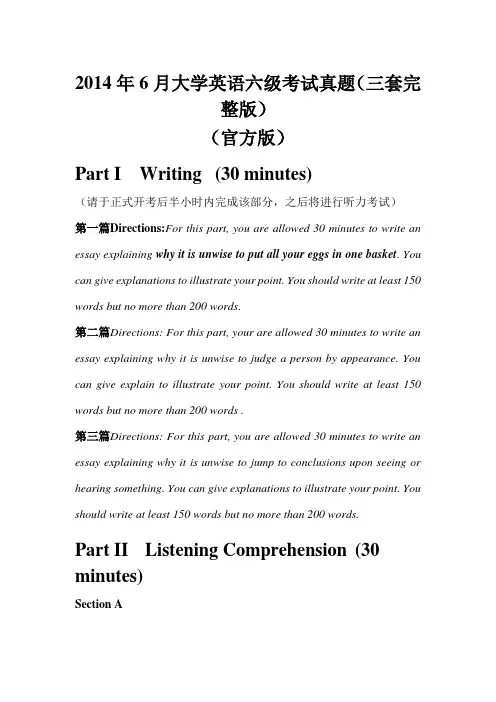
2014年6月大学英语六级考试真题(三套完整版)(官方版)Part I Writing (30 minutes)(请于正式开考后半小时内完成该部分,之后将进行听力考试)第一篇Directions:For this part, you are allowed 30 minutes to write an essay explaining why it is unwise to put all your eggs in one basket. You can give explanations to illustrate your point. You should write at least 150 words but no more than 200 words.第二篇Directions: For this part, your are allowed 30 minutes to write an essay explaining why it is unwise to judge a person by appearance. You can give explain to illustrate your point. You should write at least 150 words but no more than 200 words .第三篇Directions: For this part, you are allowed 30 minutes to write an essay explaining why it is unwise to jump to conclusions upon seeing or hearing something. You can give explanations to illustrate your point. You should write at least 150 words but no more than 200 words.Part II Listening Comprehension (30 minutes)Section ADirections:In this section, you will hear 8 short conversations and 2 long conversations. At theend of each conversation, one or more questions will be asked about what was said. Both the conversation and the questions will be spoken only once. After each question there will be a pause. During the pause, you must read the four choices marked A), B), C) and D), and decide which is the best answer. Then mark the corresponding letter on Answer Sheet 1 with a single line through the centre.注意:此部分试题请在答题卡1 上作答。
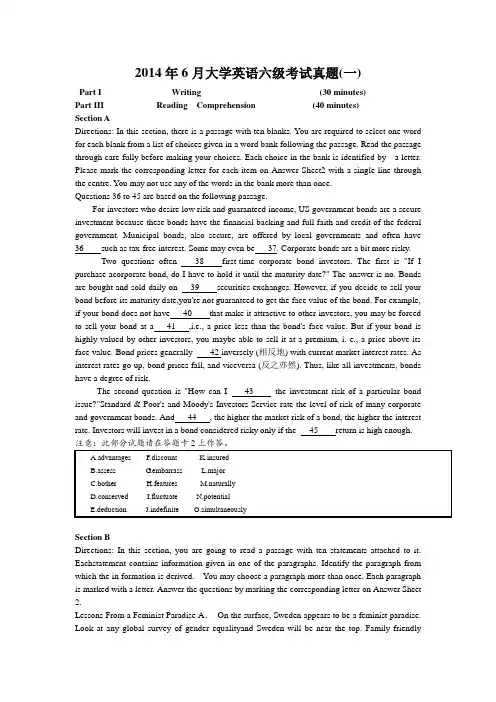
2014年6月大学英语六级考试真题(一)Part I Writing (30 minutes)Part III Reading Comprehension (40 minutes)Section ADirections: In this section, there is a passage with ten blanks. You are required to select one word for each blank from a list of choices given in a word bank following the passage. Read the passage through care fully before making your choices. Each choice in the bank is identified by a letter. Please mark the corresponding letter for each item on Answer Sheet2 with a single line through the centre. You may not use any of the words in the bank more than once.Questions 36 to 45 are based on the following passage.For investors who desire low risk and guaranteed income, US government bonds are a secure investment because these bonds have the financial backing and full faith and credit of the federal government. Municipal bonds, also secure, are offered by local governments and often have 36 such as tax-free interest. Some may even be 37. Corporate bonds are a bit more risky.Two questions often 38 first-time corporate bond investors. The first is "If I purchase acorporate bond, do I have to hold it until the maturity date?" The answer is no. Bonds are bought and sold daily on 39 securities exchanges. However, if you decide to sell your bond before its maturity date,you're not guaranteed to get the face value of the bond. For example, if your bond does not have 40 that make it attractive to other investors, you may be forced to sell your bond at a 41 ,i.e., a price less than the bond's face value. But if your bond is highly valued by other investors, you maybe able to sell it at a premium, i. e., a price above its face value. Bond prices generally 42 inversely (相反地) with current market interest rates. As interest rates go up, bond prices fall, and viceversa (反之亦然). Thus, like all investments, bonds have a degree of risk.The second question is "How can I 43 the investment risk of a particular bond issue?"Standard & Poor's and Moody's Investors Service rate the level of risk of many corporate and government bonds. And 44 , the higher the market risk of a bond, the higher the interest rate. Investors will invest in a bond considered risky only if the 45 return is high enough. 注意:此部分试题请在答题卡2上作答。
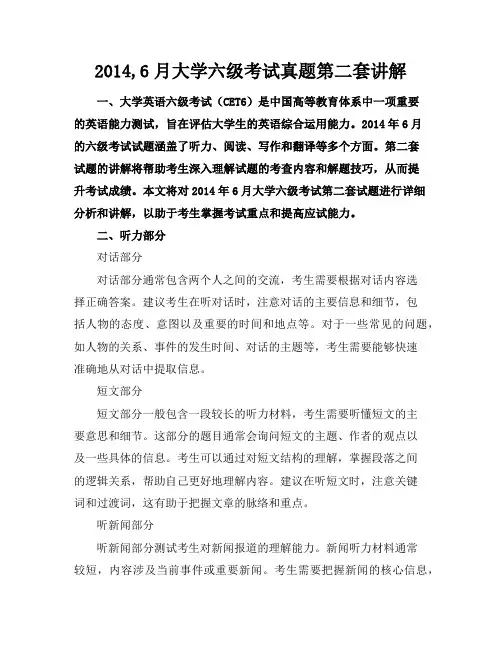
2014,6月大学六级考试真题第二套讲解一、大学英语六级考试(CET6)是中国高等教育体系中一项重要的英语能力测试,旨在评估大学生的英语综合运用能力。
2014年6月的六级考试试题涵盖了听力、阅读、写作和翻译等多个方面。
第二套试题的讲解将帮助考生深入理解试题的考查内容和解题技巧,从而提升考试成绩。
本文将对2014年6月大学六级考试第二套试题进行详细分析和讲解,以助于考生掌握考试重点和提高应试能力。
二、听力部分对话部分对话部分通常包含两个人之间的交流,考生需要根据对话内容选择正确答案。
建议考生在听对话时,注意对话的主要信息和细节,包括人物的态度、意图以及重要的时间和地点等。
对于一些常见的问题,如人物的关系、事件的发生时间、对话的主题等,考生需要能够快速准确地从对话中提取信息。
短文部分短文部分一般包含一段较长的听力材料,考生需要听懂短文的主要意思和细节。
这部分的题目通常会询问短文的主题、作者的观点以及一些具体的信息。
考生可以通过对短文结构的理解,掌握段落之间的逻辑关系,帮助自己更好地理解内容。
建议在听短文时,注意关键词和过渡词,这有助于把握文章的脉络和重点。
听新闻部分听新闻部分测试考生对新闻报道的理解能力。
新闻听力材料通常较短,内容涉及当前事件或重要新闻。
考生需要把握新闻的核心信息,包括事件的背景、主要人物、事件的经过以及结果等。
考生可以通过积累时事新闻的背景知识,提升对新闻内容的理解能力。
注意新闻报道中的数字和时间等具体信息也是解题的关键。
三、阅读部分阅读部分是考试的核心部分,主要考查考生的阅读理解能力。
2014年6月大学六级考试第二套试题阅读部分的讲解如下:选词填空选词填空题测试考生对文章语境的理解和词汇的掌握。
考生需要根据上下文选择合适的词汇填入空白处。
建议考生在做这类题目时,先快速阅读全文,把握文章的整体意思,然后根据上下文的语境选择最符合的词汇。
在选择时,注意词汇的搭配和语法结构,以确保填入的词汇既符合语义又符合语法。
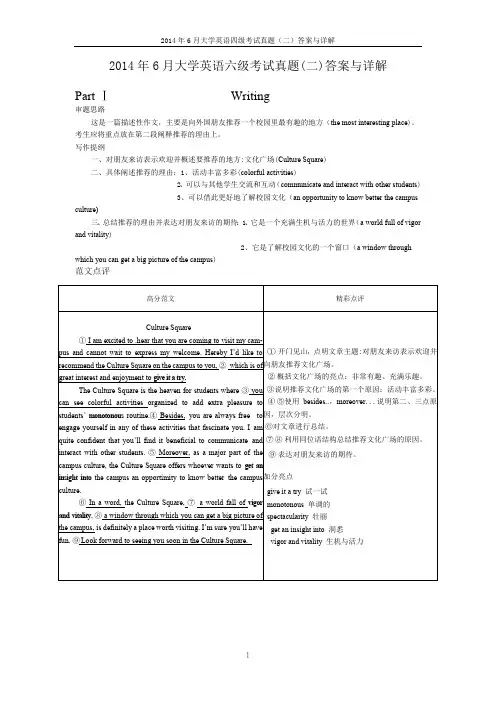
2014年6月大学英语六级考试真题(二)答案与详解Part ⅠWriting审题思路这是一篇描述性作文,主要是向外国朋友推荐一个校园里最有趣的地方(the most interesting place)。
考生应将重点放在第二段阐释推荐的理由上。
写作提纲一、对朋友来访表示欢迎并概述要推荐的地方:文化广场(Culture Square)二、具体阐述推荐的理由:1、活动丰富多彩(colorful activities)2、可以与其他学生交流和互动(communicate and interact with other students)3、可以借此更好地了解校园文化(an opportunity to know better the campus culture)三、总结推荐的理由并表达对朋友来访的期待:1、它是一个充满生机与活力的世界(a world full of vigor and vitality)2、它是了解校园文化的一个窗口(a window through which you can get a big picture of the campus)范文点评高分范文精彩点评Culture Square① I am excited to .hear that you are coming to visit my cam-pus and cannot wait to express my welcome. Hereby I’d like to recommend the Culture Square on the campus to you, ② which is of great interest and enjoyment to give it a try.The Culture Square is the heaven for students where ③ you can see colorful activities organized to add extra pleasure to students’ monotonous routine.④ Besides, you are always free to engage yourself in any of these activities that fascinate you. I am quite confident that you’ll find it beneficial to communicate and interact with other students. ⑤Moreover, as a major part of the campus culture, the Culture Square offers whoever wants to get an insight into the campus an opportimity to know better the campus culture.⑥In a word, the Culture Square, ⑦ a world fall of vigor and vitality, ⑧ a window through which you can get a big picture of the campus, is definitely a place worth visiting. I’m sure you’ll have fun. ⑨ Look forward to seeing you soon in the Culture Square. ①开门见山,点明文章主题:对朋友来访表示欢迎并向朋友推荐文化广场。
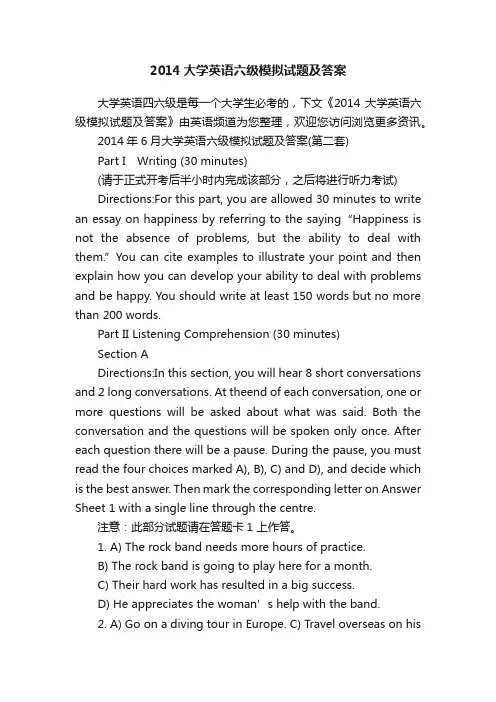
2014大学英语六级模拟试题及答案大学英语四六级是每一个大学生必考的,下文《2014大学英语六级模拟试题及答案》由英语频道为您整理,欢迎您访问浏览更多资讯。
2014年6月大学英语六级模拟试题及答案(第二套)Part I Writing (30 minutes)(请于正式开考后半小时内完成该部分,之后将进行听力考试)Directions:For this part, you are allowed 30 minutes to write an essay on happiness by referring to the saying“Happiness is not the absence of problems, but the ability to deal with them.”You can cite examples to illustrate your point and then explain how you can develop your ability to deal with problems and be happy. You should write at least 150 words but no more than 200 words.Part II Listening Comprehension (30 minutes)Section ADirections:In this section, you will hear 8 short conversations and 2 long conversations. At theend of each conversation, one or more questions will be asked about what was said. Both the conversation and the questions will be spoken only once. After each question there will be a pause. During the pause, you must read the four choices marked A), B), C) and D), and decide which is the best answer. Then mark the corresponding letter on Answer Sheet 1 with a single line through the centre.注意:此部分试题请在答题卡1 上作答。
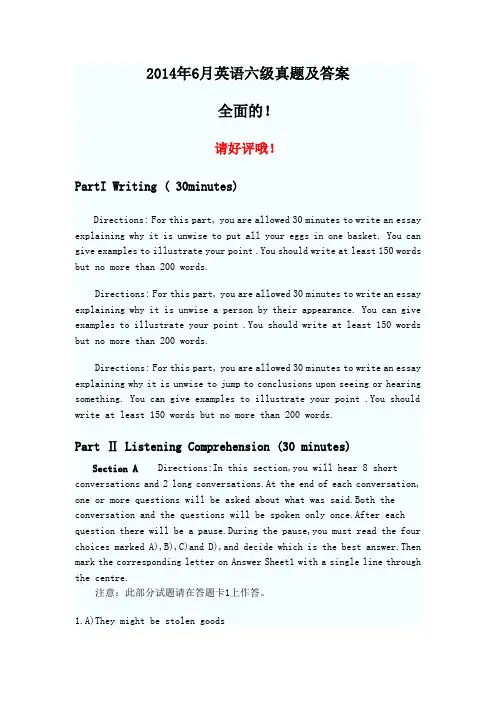
2014年6月英语六级真题及答案全面的!请好评哦!PartI Writing ( 30minutes)Directions: For this part, you are allowed 30 minutes to write an essay explaining why it is unwise to put all your eggs in one basket. You can give examples to illustrate your point .You should write at least 150 words but no more than 200 words.Directions: For this part, you are allowed 30 minutes to write an essay explaining why it is unwise a person by their appearance. You can give examples to illustrate your point .You should write at least 150 words but no more than 200 words.Directions: For this part, you are allowed 30 minutes to write an essay explaining why it is unwise to jump to conclusions upon seeing or hearing something. You can give examples to illustrate your point .You should write at least 150 words but no more than 200 words.Part Ⅱ Listening Comprehension (30 minutes)Section A Directions:In this section,you will hear 8 short conversations and 2 long conversations.At the end of each conversation, one or more questions will be asked about what was said.Both the conversation and the questions will be spoken only once.After each question there will be a pause.During the pause,you must read the four choices marked A),B),C)and D),and decide which is the best answer.Then mark the corresponding letter on Answer Sheet1 with a single line through the centre.注意:此部分试题请在答题卡1上作答。
2014年6月英语六级听力原文及答案短对话1.W: The students have been protesting against the increased tuition.M: Yeah, I heard about the protest. But I don’t know how much good it will do.Q: What does the man mean?2.W: Jay will turn 21 this week. Does he know the classes are having a surprised party for him? M: No, he thinks we are giving a party for the retiring dean.Q: What do we learn from the conversation?3.M: Hello, this is Carl’s garage. We found Mr. White’s briefcase and wallet after he left his car here this morning.W: He has been wondering where he could have left them. I’ll tell him to pick them up this afternoon. Thank you for calling.Q: What do we learn about Mr. White from the conversation?4.W: You know, some TV channels have been rerunning a lot of comedies from the 1960s’. What do you think of those old shows?M: Not much. But the new ones including those done by famous directors are not so entertaining either.Q: What does the man mean?5.M: How much longer should I boil these vegetables? The recipe says about 10 minutes in total. W: They look pretty done to me. I doubt you should cook them anymore.Q: What does the woman mean?6.W: Tom, are you going to your parents’ house tonight?M: Yes, I promise to help them figure out their tax returns. The tax code is really confusing to them.Q: What is the man going to do for his parents?7.W: I was surprised when I heard you’d finished your research project a whole month early. M: How I manage to do it’s still a mystery to me.Q: What does the man mean?8.W:I was hoping we could be in the same developmental psychology class.M:Me too, but by the time I went for registration the course was closed.Q: What does the man mean?2个长对话M: It's really amazing how many colors there are in these Thai silks?W: These are our new designs.M: Oh, I don't think I've seen this combination of colors before.W: They're really brilliant, aren't they?M: Quite dazzling! May I have samples of the new color combinations?W: Yes, of course. But aren't you going to place an order?M: We order them regularly, you know, but I do want our buyer who handles fabrics to see them. W: Have you looked at the wood and stone carvings? Did you like them?M: Oh, they aren't really what I'm looking for.W: What do you have in mind?M: That's the trouble. I never know exactly until I see it. I usually have more luck when I get away from the tourist places.W: Out in the countryside you mean.M: Yeah, exactly. Markets in small towns have turned out best for me.W: You're more interested, then, in handicrafts that haven't been commercialized.M: Yes, real folk arts, pots, dishes, basket ware — the kinds of things that people themselves use.W: I'm sure we can arrange a trip out into the country for you.M: I was hoping you'd say that.W: We can drive out of Bangkok and stop whenever you see something that interests you.M: That would be wonderful! How soon could we leave?W: I can't get away tomorrow. But I think I can get a car for the day after.M: And would we have to come back the same day?W: No, I think I'll be able to keep the car for three or four days.M: Wonderful! That'll give me time for a real look around.9. What attracts the man to the Thai silks?10. What is the man looking for in Thailand?11. What do we learn about the trip the woman promised to arrange for the man?W: Well, before we decide we're going to live in Enderby, we really ought to have a look at the schools. We want the children to have a good secondary education, so we'd better see what's available.M: They gave me some information at the district office and I took notes. It appears there are five secondary schools in Enderby -- three state schools and two private.W: I don't know if we want private schools, do we?M: I don't think so, but we'll look at them anyway. There're Saint Mary's, that's a catholic school for girls and Carlton Abbey, that's a very old boys' boarding school, founded in 1672.W: Are all the state schools co-educational?M: Yes, it seems so.W: I think little Keith is very good with his hands. We're to send him to a school with good vocational training -- carpentry, electronics, that's sort of thing.M: In that case, we are best off at Enderby Comprehensive. I gather they have excellent workshops and instructors. But it says here the Donwell also has good facilities. Enderby High has a little, but they are mostly academic. No vocational training at all at Carlton Abbey or Saint Mary's. W: What are the schools like academically? How many children go on to university every year? M: Well, Enderby High is very good. And Carlton Abbey even better, 70% percent of their pupils go on to university. Donwell isn't so good. Only 8%. And Enderby Comprehensive in Saint Mary's not much more, about 10%.W: Well, it seems like there is a broad selection of schools. But we have to find out more than statistics before we can decide.12. What do they want their children to have?13. What do the speakers say about little Keith?14. What school has the highest percentage of pupils who go on to university?15. What are the speakers going to do next?短文一Good morning, ladies and gentlemen! As instructed in our previous meeting, the subcommittee on building development has now drawn up a brief to submit to the firm's architect. In short, the building would consist of two floors. There would be a storage area in the basement to be used by the research center as well as by other departments. We are, as you know, short of storage base, so the availability of a large basement would be a considerable advantage. The ground floor would be occupied by laboratories. Altogether there would be six labs. In addition, there would be six offices for the technicians, plus a general secretarial office and reception area. The first floor would be occupied by the offices of Research and Development staff. There would be a suite of offices for the Research and Development director as well as a general office for secretarial staff. It's proposed to have a staff room with a small kitchen. This would serve both floors. There would also be a library for research documents and reference material. In addition, there would be a resource room in which audio visual equipment and other equipment of that sort could be stored. Finally, there would be a seminar room with closed circuit television. This room could also be used to present displays and demonstrations to visitors to the center. The building would be of brick construction so it's to conform to the general style of construction on the site. There would be a pitched roof. Wall and ceiling spaces would be insulated to conform to new building regulations.Questions 16 to 18 are based on the passage you've just heard.16. What is said about the planned basement of the new building?17. Where would be the Research and Development director's office?18. Why would the building be of brick construction?短文二Huang Yi works for a company that sells financial software to small and medium size businesses. His job is to show customers how to use the new software. He spends two weeks with each client, demonstrating the features and functions of the software. The first few months in the job were difficult. He often left the client feeling that even after two weeks he hadn't been able to show the employees everything they needed to know. It's not that they weren't interested; they obviously appreciated his instruction and showed a desire to learn. Huang couldn't figure it out the software was difficult for them to understand, or if he was not doing a good job of teaching. During the next few months, Huang started to see some patterns. He would get to a new client site and spend the first week going over the software with the employees. He usually did this in ships, with different groups of employees listening to him lecture. Then he would spend the next week in installing the program and helping individuals trouble-shoot. Huang realized that during the week of trouble shooting and answering questions, he ended up addressing the same issues over and over. He was annoyed because most of the individuals with whom he worked seem to have retained very little information from the first week. They asked very basic questions and often needed prompting from beginning to end. At first, he wondered if these people were just a little slow, but then he began to get the distinct feeling that part of the problem might be his style presenting information.Questions 19 to 22 are based on the passage you've just heard.19. What does Huang Yi do in his company?20. What did Huang Yi think of his work?21. What did Huang Yi do in addition to lecturing?22. What did Huang Yi realize in the end?短文三As we help children get out into the world to do their learning well, we can get more of the world into the schools. Aside from their parents, most children never have any close contact with any adults except their teachers. No wonder they have no idea what adult life or work is like. We need to bring more people who are not full-time teachers into the schools. In New York City, under the teachers' and writers' collaborative, real writers come into the schools, read their work, and talk to the children about the problems of their craft. The children love it. In another school, a practicing attorney comes in every month and talks to several classes about the law. Not the law it is in books, but the law as he sees it and encounters it in his cases. And the children listen with intense interest. Here's something even easier: let children work together, help each other, learn from each other and each other's mistakes. We now know from this experience of many schools that children are often the best teachers of other children. What's more important, we know that when the fifth floor six-grader who is being having trouble with reading, starts helping a first-grader, his own reading sharply improves. A number of schools are beginning to use what some call paired learning. This means that you let children form partnerships with other children. Do their work even including their tests together and share whatever marks or results this work gets. Just like grown-ups in the real world. It seems to work.Questions 23 to 25 are based on the passage you've just heard.23: Why does the speaker say most children have no idea what adult life is like?24: What is happening in New York City schools?25: What does the experience of many schools show?复合式听写Tests may be the most unpopular part of academic life. Students hate them because they produce fear andanxiety about being evaluated, and focus on grades instead of learning for learning's sake. But tests are also valuable. A well-constructed test identifies what you know and what you still need to learn. Tests help you see how your performance compares to that of others. And knowing that you'll be tested on a body of material is certainly likely to motivate you to learn the material more thoroughly. However, there's another reason you might dislike tests. You may assume that tests have the power to define your worth as a person. If you do badly on a test, you may be tempted to believe that you received some fundamental information about yourself from the professor --- information that says you are a failure in some significant way. This is a dangerous and wrong-headed assumption. If you do badly on a test, it doesn't mean you are a bad person or stupid or that you'll never do better again and that your life is ruined. If you don't do well on a test, you're the same person you were before you took the test. No better, no worse. You just did badly on a test. That's it! In short, tests are not a measure of your value as an individual. They're a measure only of how well and how much you studied. Tests are tools. They're indirect and imperfect measures of what we know.答案:1. C. He is doubtful about the effect of the students’action.2. D. The class has kept the party a secret from Jay.3. C. He left his things with his car in the garage.4. D. TV comedies have not improved much since the 1960s.5. D. The man should stop boiling the vegetables.6. A. Sort out their tax returns.7. A. He didn’t expect to complete his work so soon.8. B. He has failed to register for the course.9. B. The new color combinations.10. C. Local handicrafts.11. B. It will be out into the countryside.【点评】该对话主要讲述了这位男士为泰国丝绸中一些新的颜色组合所吸引,想索要一些样品,同时,女士又推荐了一些别的东西,但男士不是很感兴趣,男士想去小城镇市场看看,并对没有商业化的手工艺品更感兴趣,所以,这位女士答应带这位男士去乡村看看有没有他想要的东西。
2014年英语六级真题PartI Writing ( 30minutes)1.Directions: For this part, you are allowed 30 minutes to write an essay explaining why it is unwise to put all your eggs in one basket. You can give examples to illustrate your point .You should write at least 150 words but no more than 200 words.Or 2.Directions: For this part, you are allowed 30 minutes to write an essay explaining why it is unwise a person by their appearance. You can give examples to illustrate your point .You should write at least 150 words but no more than 200 words.Or3.Directions: For this part, you are allowed 30 minutes to write an essay explaining why it is unwise to jump to conclusions upon seeing or hearing something. You can give examples to illustrate your point .You should write at least 150 words but no more than 200 words. Part ⅡListening Comprehension (30 minutes)Section ADirections:In this section,you will hear 8 short conversations and 2 long conversations.At the end of each conversation, one or more questions will be asked about what was said.Both the conversation and the questions will be spoken only once.After each question there will be a pause.During the pause,you must read the four choices marked A),B),C)and D),and decide which is the best answer.Then mark the corresponding letter on Answer Sheet1 with a single line through the centre.注意:此部分试题请在答题卡1上作答。
2014年6月大学英语六级考试真题(第二套) Part I Writing (30 minutes) Directions: For this part, you are allowed 30 minutes to write an essay explaining why it is unwise to jump to conclusions upon seeing or hearing something. You can give examples to illustrate your point. You should write at least 150 words but no more than 200 words. Part II Listening Comprehension (30 minutes) Section A Directions: In this section, you will hear 8 short conversations and 2 long conversations. At the end of each conversation, one or more questions will be asked about what was said. Both the conversation and the questions will be spoken only once. After each question there will be a pause. During the pause, you must read the four choices marked A), B), C) and D), and decide which is the best answer. Then mark the corresponding letter on Answer Sheet 1 with a single line through the centre. 1. A) College tuition has become a heavy burden for the students. B) College students are in general politically active nowadays. C) He is doubtful about the effect of the students’ action. D) He took part in many protests when he was at college. 2. A) Jay is organizing a party for the retiring dean. B) Jay is surprised to learn of the party for him. C) The dean will come to Jay’s birthday party. D) The class has kept the party a secret from Jay. 3. A) He found his wallet in his briefcase. B) He went to the lost-and-found office. C) He left his things with his car in the garage. D) He told the woman to go and pick up his car. 4. A) The show he directed turned out to be a success. B) He watches only those comedies by famous directors. C) New comedies are exciting, just like those in the 1960s. D) TV comedies have not improved much since the 1960s. 5. A) All vegetables should be cooked fresh. B) The man should try out some new recipes. C) Overcooked vegetables are often tasteless. D) The man should stop boiling the vegetables. 6. A) Sort out their tax returns. C) Figure out a way to avoid taxes. B) Help them tidy up the house. D) Help them to decode a message. 7. A) He didn’t expect to complete his work so soon. B) He has devoted a whole month to his research. C) The woman is still trying to finish her work. D) The woman remains a total mystery to him. 8. A) He would like to major in psychology too. B) He has failed to register for the course. C) Developmental psychology is newly offered. D) There should be more time for registration. Questions 9 to 11 are based on the conversation you have just heard. 9. A) The brilliant product design. C) The unique craftsmanship. B) The new color combinations. D) The texture of the fabrics. 10. A) Unique tourist attractions. C) Local handicrafts. B) Traditional Thai silks. D) Fancy products. 11. A) It will be on the following weekend. C) It will last only one day. B) It will be out into the countryside. D) It will start tomorrow. Questions 12 to 15 are based on the conversation you have just heard. 12. A) A good secondary education. C) A happy childhood. B) A pleasant neighbourhood. D) A year of practical training. 13. A) He ought to get good vocational training. C) He is academically gifted. B) He should be sent to a private school. D) He is good at carpentry. 14. A) Donwell School. C) Carlton Abbey. B) Enderby High. D) Enderby Comprehensive. 15. A) Put Keith in a good boarding school. B) Talk with their children about their decision. C) Send their children to a better private school. D) Find out more about the five schools. Section B Directions: In this section, you will hear 3 short passages. At the end of each passage, you will hear some questions. Both the passage and the questions will be spoken only once. After you hear a question, you must choose the best answer from the four choices marked A), B), C) and D). Then mark the corresponding letter on Answer Sheet 1 with a single line through the centre. Passage One Questions 16 to 18 are based on the passage you have just heard. 16. A) It will be brightly lit. C) It will have a large space for storage. B) It will be well ventilated. D) It will provide easy access to the disabled. 17. A) On the first floor. C) Opposite to the library. B) On the ground floor. D) On the same floor as the labs. 18. A) To make the building appear traditional. B) To match the style of construction on the site. C) To cut the construction cost to the minimum. D) To embody the subcommittee’s design concepts. Passage Two Questions 19 to 22 are based on the passage you have just heard. 19. A) Sell financial software. C) Train clients to use financial software. B) Write financial software. D) Conduct research on financial software. 20. A) Unsuccessful. C) Tedious. B) Rewarding. D) Important. 21. A) He offered online tutorials. C) He gave the trainees lecture notes. B) He held group discussions. D) He provided individual support. 22. A) The employees were a bit slow to follow his instruction. B) The trainees’ problems have to be dealt with one by one. C) Nobody is able to solve all the problems in a couple of weeks. D) The fault might lie in his style of presenting the information. Passage Three Questions 23 to 25 are based on the passage you have just heard. 23. A) Their parents tend to overprotect them. B) Their teachers meet them only in class. C) They have little close contact with adults. D) They rarely read any books about adults. 24. A) Real-life cases are simulated for students to learn law. B) Writers and lawyers are brought in to talk to students. C) Opportunities are created for children to become writers. D) More Teacher and Writer Collaboratives are being set up. 25. A) Sixth-graders can teach first-graders as well as teachers. B) Children are often the best teachers of other children. C) Paired Learning cultivates the spirit of cooperation. D) Children like to form partnerships with each other. Section C